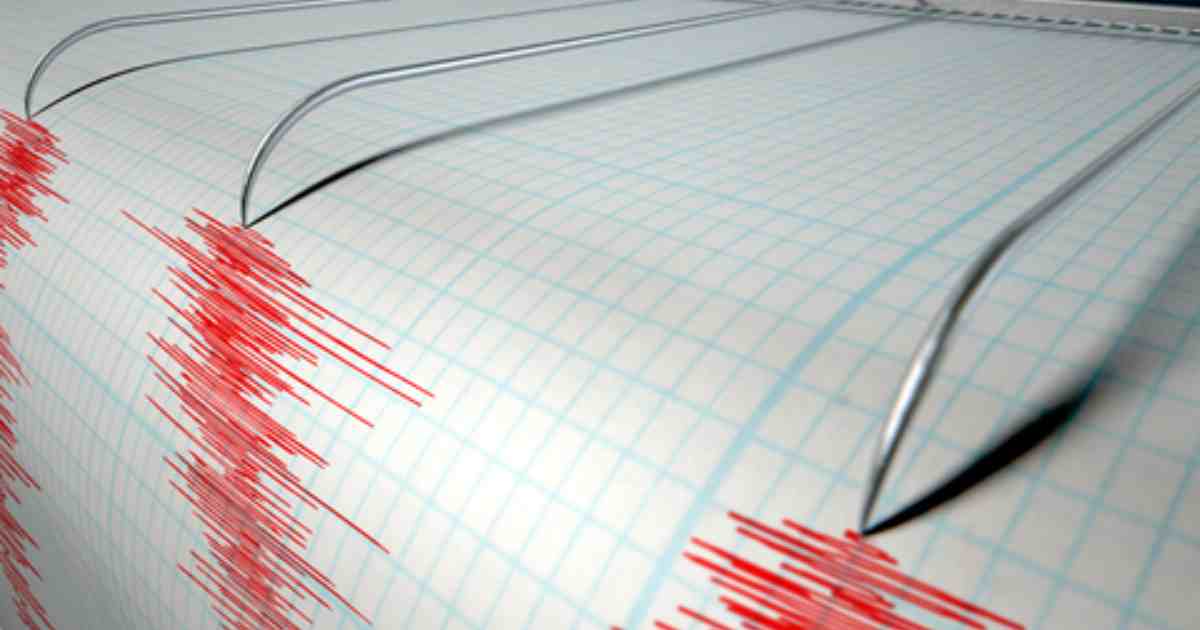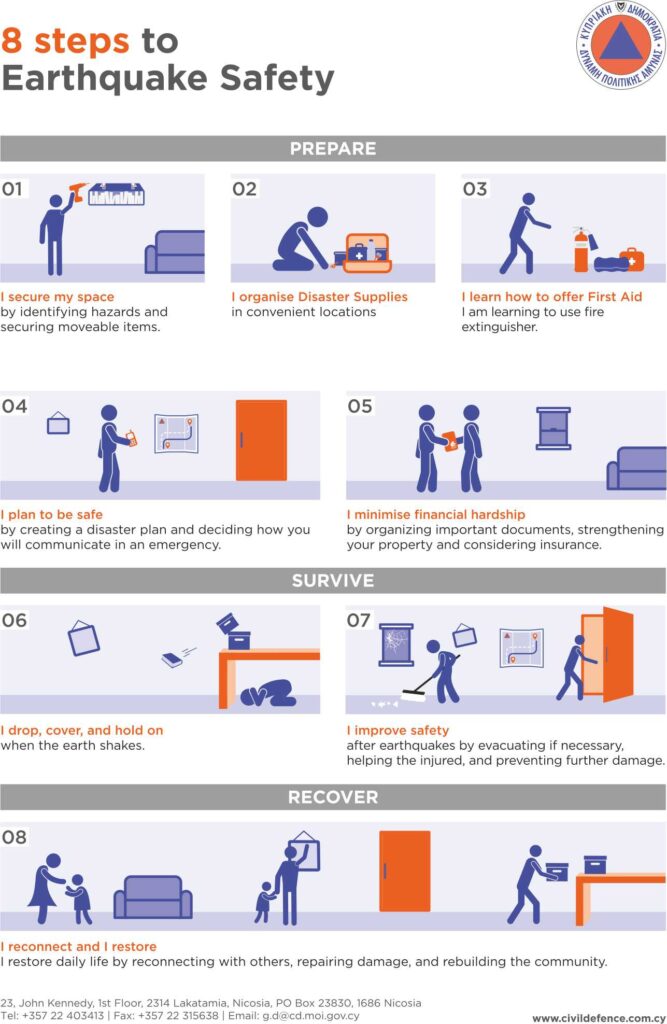
The Civil Defence Force makes the following recommendations to the public in order to take measures for safety and self-protection from any earthquakes:
PREVENTION
At home / office / school:
- Fix shelves and bookcases firmly to the walls.
- Remove tall furniture from doors that can move and block possible escape exits.
- Place large and heavy items and anything else that can fall and break lower on the shelves.
- Remove heavy objects from above beds and sofas.
- Mark now which are the safest places in your home, school, workplace or employment to take refuge in the event of an earthquake:
- under sturdy tables, desks or desks
- away from glass surfaces and bookcases
- away from external walls
- Secure the water heater and fuel and water tanks securely.
- Secure light fixtures and ceiling fans.
- Check the correct operation of the electricity and natural gas supply network.
- Tell your family members / office staff how to turn off the main electricity, water and gas switches and the emergency telephone number, 112.
- Stock up on a portable radio with batteries and a first aid kit.
- Place a fire extinguisher in an accessible place and practice using it.
If you are away from home / office / school:
- Choose a safe post-earthquake meeting place that is:
- away from buildings and trees
- away from telephone and electrical cables.
AT THE TIME OF THE EARTHQUAKE
If you are indoors:
- Remain calm. Do not panic.
- Take cover under some sturdy piece of furniture (table or desk), kneel down and hold his leg with your hands.
- If there is no sturdy furniture, kneel in the middle of the room, lowering your height as much as possible and protect your head and neck with your hands.
- Move away from large glass surfaces (windows, glass partitions) or furniture and objects that could injure you.
- Do not try to move away from home.
- Do not go out on the balcony.
If you are in a tall building:
- Move away from windows and exterior walls.
- Stay in the area until the vibration stops.
- Do not use the elevator to escape. There is a risk of it falling or trapping you in it, due to a power failure or distortion in its guides.
- Do not stand on open windows, balconies or on the edges of roofs. The vibration can cause you to fall into the void.
If you are in an entertainment venue, shopping center or large store:
- Stay in the area until the vibration ends.
- Don’t get carried away by the panicked crowd moving disorderly towards the exits, or you risk getting trampled.
If you are in an open space:
- Avoid standing near buildings, rocks, electric poles or objects that may fall and injure you.
- If you have a bag or briefcase with you, cover your head with it.
- Move away from the coasts. After a strong earthquake, waves can be created with great speed and height that will sweep the coasts.
If you are in the car:
- Park as quickly and carefully as you can in an area that does not obstruct traffic, away from high-rise buildings, piles or rocks.
- Avoid going through tunnels, bridges or overpasses.
AFTER THE EARTHQUAKE
If you are indoors:
- Prepare for any aftershocks
- Carefully check yourself and those around you for possible injuries.
- Immediately help children, as well as disabled, infirm, sick or elderly people to protect themselves.
- If you are stranded or trapped somewhere from which you cannot escape, by all means try to give signs of life so that rescue crews can locate you.
- If a fire has broken out somewhere, put it out before it gets bigger.
- Avoid entering your home if you see damage, cut wires, gas or gas leaks.
- Do not touch power cables and objects that touch cables. Risk of electric shock.
- Do not attempt to move a seriously injured person unless their life is in immediate danger.
- Do not enter damaged buildings until the relevant authorities have assured you that they are safe.
- Evacuate the building from the stairwell (do not use the elevator), after first turning off the electric, gas and water switches.
- Use your landline or mobile phone only in exceptional cases, because the telephone networks are overloaded, which prevents the smooth coordination of the actions of the Response Services tasked with dealing with the consequences of the earthquake.
- Respond to calls for help, but don’t drive around unnecessarily so rescue crews can get around unhindered.
- Escape to an open and safe area.
- Follow the instructions of the Authorities and do not pay attention to rumours.
HOW TO REACT TO AN ONCOMING GRAVITY WAVE (TSUNAMI)
If you are in a coastal area with low altitude
- Although not all earthquakes cause tsunamis, stay alert.
- Notice if there is a significant rise or fall in the water level, which is a natural warning.
- Move away from the sea and head to higher altitude inland areas. A small tsunami at one point on the coast can turn into a large tsunami, kilometers away.
- Stay away from the coast. A tsunami does not consist of just one wave but of a series of waves so return only after being informed by the competent authorities that there is no danger.
- Do not go near the shores to watch an incoming tsunami. By the time you see it, it may be too late to avoid it.
Source: pio.gov.cy
More information about the Civil Defence can be found on their website here
The 8 Steps To Earthquake Safety Flyer can be downloaded and printed in English and Greek here










